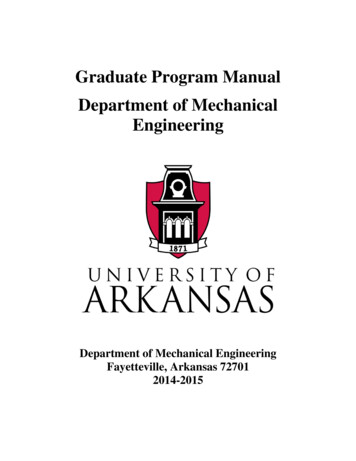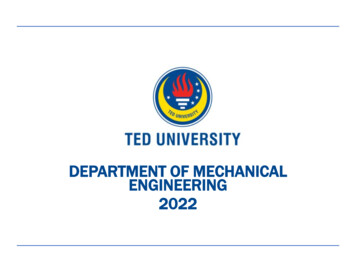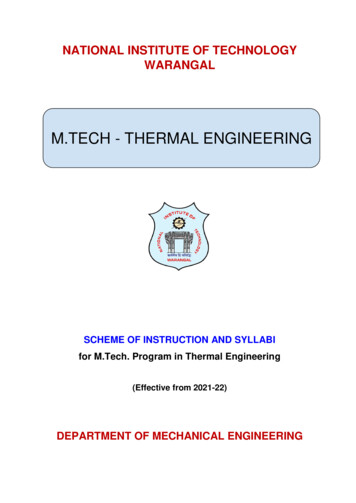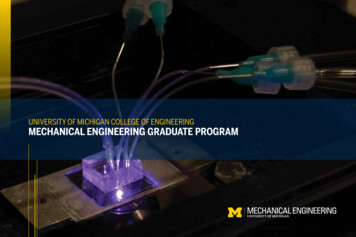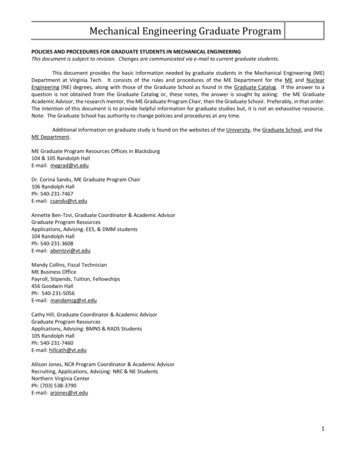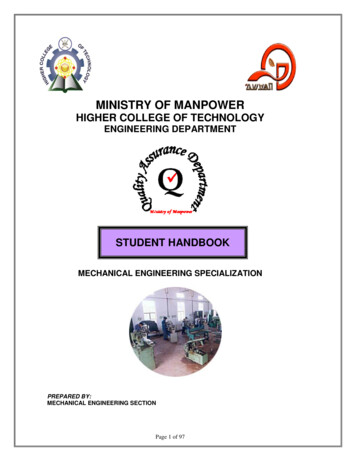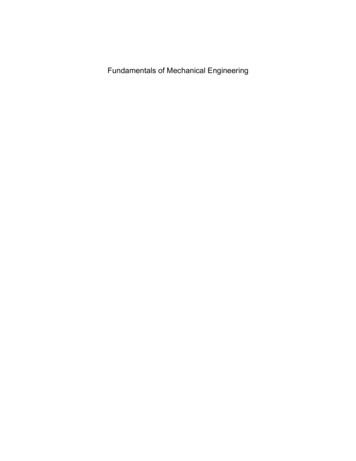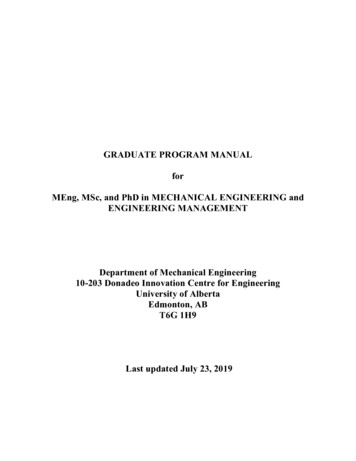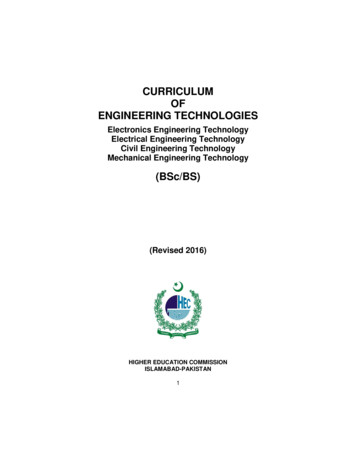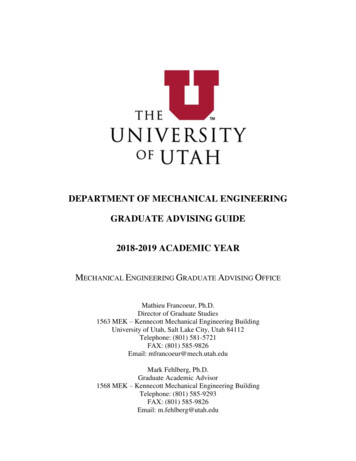
Transcription
DEPARTMENT OF MECHANICAL ENGINEERINGGRADUATE ADVISING GUIDE2018-2019 ACADEMIC YEARMECHANICAL ENGINEERING GRADUATE ADVISING OFFICEMathieu Francoeur, Ph.D.Director of Graduate Studies1563 MEK – Kennecott Mechanical Engineering BuildingUniversity of Utah, Salt Lake City, Utah 84112Telephone: (801) 581-5721FAX: (801) 585-9826Email: mfrancoeur@mech.utah.eduMark Fehlberg, Ph.D.Graduate Academic Advisor1568 MEK – Kennecott Mechanical Engineering BuildingTelephone: (801) 585-9293FAX: (801) 585-9826Email: m.fehlberg@utah.edu
TABLE OF CONTENTSTABLE OF CONTENTS . 1SECTION I: ABOUT THE DEPARTMENT . 2DEPARTMENT OF MECHANICAL ENGINEERING GRADUATE PROGRAMS . 3SECTION II: DEGREE PROGRAMS OFFERED . 4MASTER OF SCIENCE, THESIS . 6MASTER OF SCIENCE, NON-THESIS . 9BACHELOR OF SCIENCE/MASTER OF SCIENCE PROGRAM . 12MASTER OF SCIENCE/MASTER OF BUSINESS ADMINISTRATION DUAL DEGREEPROGRAM . 16MASTER OF PHILOSOPHY . 19DOCTOR OF PHILOSOPHY, POST-M.S. . 20DOCTOR OF PHILOSOPHY, POST-B.S. . 25SECTION III: ABOUT THE PH.D. QUALIFYING EXAM. 30Exam Instructions . 31SECTION IV: PHD PROPOSAL AND DISSERTATION DEFENSE SUMMARIES . 34SECTION V: STUDENT BENEFITS . 37FINANCIAL SUPPORT . 38GRADUATE STUDENT HEALTH INSURANCE . 41SECTION VI: INDEX OF POLICIES . 42IMPORTANT POLICIES . 43SECTION VII: STUDENT RESOURCES. 50HOW TO TRANSFER COURSES FROM ANOTHER UNIVERSITY . 51SAFETY AND WELLNESS. 52RESOURCES AROUND CAMPUS . 53USEFUL WEBSITES. 54APPROVED MATH ELECTIVES . 56
SECTION I: ABOUT THE DEPARTMENT
DEPARTMENT OF MECHANICAL ENGINEERING GRADUATEPROGRAMSDegrees OfferedThe Department of Mechanical Engineering at the University of Utah (abbreviated ME EN)administers graduate programs of study and grants the following graduate degrees in mechanicalengineering: Master of Science (Thesis and Non-Thesis)Bachelor of Science/Master of Science (Thesis)Master of Science/Master of Business Administration Dual Degree (Non-Thesis)Master of PhilosophyDoctor of PhilosophyAbout Our PoliciesME EN graduate programs are operated according to the policies and procedures of the GraduateSchool and those found within this document. The Graduate Catalog, which documents allimportant policies and procedures, is accessible through the University of Utah website athttp://gradschool.utah.edu/graduate-catalog/. The catalog is a comprehensive source ofinformation about admission, registration, financial aid, housing, campus facilities, degreerequirements and departmental degree programs.The Department and the University seek to provide equal access to its programs, services, andactivities to people with disabilities.Any requests for exceptions to these general admission policies should be directed in writing tothe ME EN Director of Graduate Studies.3
SECTION II: DEGREE PROGRAMS OFFERED4
RequirementTable 1: Numerical Comparison of Graduate Degree RequirementsM.S.M.S.(Thesis) (Non-thesis)Program CourseworkMinimum total credit hoursMinimum regular course1 credit hoursMinimum regular Mechanical Engineering course credit hoursMinimum regular Mechanical Engineering course credit hours at 7000 levelMaximum credit hours for ME EN 6950 Independent Study (after B.S.)Minimum credit hours in area of specializationResearchCredit hours for ME EN 6975 M.S. Thesis ResearchMinimum credit hours for ME EN 7970 Ph.D. DissertationAdministrativeMinimum credit hours at the University of UtahMaximum transfer credit hoursMaximum non-matriculated credit hoursMaximum credit hours taken as an undergraduate applied to graduate degree(cannot also apply to B.S. degree)Minimum credit hours for full-time statusSupervisory Committee members (majority must be regular ME EN faculty)Time limit 2469266947696606934934957957Notes:1. ME EN or allied field course taken at the 6000/7000 level.2. “Regular” ME EN courses scheduled classroom/lab courses including 6960 and 7960.
MASTER OF SCIENCE, THESISAbout the DegreeThe Master of Science, Thesis (MST) is a research-oriented degree. A student who intends topursue the Ph.D. degree at a later stage is encouraged to pursue the MST rather than the Masterof Science, Non-Thesis degree because of its research orientation.Course Requirements 30 Total Credit Hourso 21 credit hours in courses relevant to the student's academic program All regular courses to be counted toward the degree must be graded B- orhigher 12 credit hours must be in regular ME EN courses 9 credit hours of electives in Math, Science or Engineering.o 9 credit hours of ME EN 6975, Master’s Thesis Research (graded CR/NC) All additional research credit hours must be ME EN No more than 3 credit hours of independent study (ME EN 6950) may be usedo Note that these credit hours do not count as “regular” ME EN courses No more than 9 non-matriculated credit hours No more than 6 transfer credits Only courses in engineering, mathematics, and science are acceptable The student must obtain an overall GPA equal to or higher than a 3.0 from all courses takenSupervisory CommitteeThe student must select a permanent supervisory committee chair by the end of the secondsemester in the program. Committees must meet the following requirements: The supervisory committee consists of three faculty members. The student’s advisor serves as the chair of the supervisory committee and must be regular(tenure-line) faculty from the Department of Mechanical Engineering. At least two of the three committee members must be regular (tenure-line) faculty from theDepartment of Mechanical Engineering. Members must have a research specialty consistent with the student’s specialization area.Program of StudyThe program of study and thesis work is completed under the direction and approval of thesupervisory committee. The committee chair (the student’s advisor) will assist the student inplanning the program of study, and should encourage breadth by selection of one or more coursesoutside of the Department in areas such as basic science, statistics, and mathematics. Graduatecourses should be selected after consultation with the student's permanent supervisory chair,temporary advisor, or the Director of Graduate Studies. The cumulative GPA of courses listedon the program of study must be greater than or equal to a 3.0.Approval process1. The student must obtain and fill out the MS Thesis Program of Study form.2. The student must list all classes – past, present, and future – that are to count toward theMST, including research hours.3. At least seven months prior to graduation, the student must gather original signatures fromall three committee members, and then submit the form to the Graduate Advisor.
4. The Graduate Advisor will then input all the information from the paper form into theelectronic records system via CIS.5. The three committee members will approve the program of study on the form. The Directorof Graduate Studies and the Graduate School will all electronically approve the programof study. Students can monitor this process by logging into CIS, locating the Graduationpanel under their student information, and clicking on “Graduate Student Summary.” It isthe responsibility of the student to monitor their online records and to secure the properapprovals.Thesis DefenseThe thesis requirement reflects the research orientation of this degree. The research workassociated with a Master of Science thesis should involve close collaboration with a facultymember. The thesis typically represents two years of research. Specifically, in a clearlydocumented manner, the thesis must: Reflect an understanding of the current and past state of knowledge in the chosen researcharea through a comprehensive literature review of the subject. Clearly state the goals of the research and justify the value of the research results to theengineering and/or scientific community. Result in a substantive contribution to the engineering and/or scientific community.The student is required to defend the thesis and research work at a formal oral presentation thatis open to the public.Scheduling the defense1. Students must first communicate with their committee members to find a date and time forthe defense. Students must schedule their defense at least two weeks in advance.2. Students need to submit a complete and formatted copy of their thesis to each committeemember at least two weeks before the scheduled defense date.3. Once a date has been set, students can see the Graduate Advisor to schedule a conferenceroom. If a conference room is not available, students will need to check with the otherdepartments in the college or with the University’s Scheduling Office to schedule a room.4. As soon as students have found a date, time, and place for the defense, they must send theGraduate Advisor the title and abstract of their thesis. The advisor will then send the studentimportant forms and information for the day of the defense.Defense paperworkTable 2: Required M.S. Thesis Defense PaperworkFORM NAMEPURPOSEWHO PREPARES ITReport of the Final ExamIndicates that the student has passedThe student, on whitethe defensepaper, two copiesSupervisory Committee Reading Indicates that the thesis is ready forThe student, on whiteApproval*format corrections. This form goes in paper, two copiesthe front of the finished, publishedthesis.Final Reading Approval*Indicates that the entire thesis isThe student, on whiteready for publication. This form goes paper, two copiesin the front of the finished, publishedthesis.7
* If the committee approves the content of the manuscript, they will sign these formsimmediately following the defense. If not, the student must make whatever corrections thecommittee recommends, and then have them sign the forms.After the defense1. Once the committee approves of the thesis content, students must submit their manuscript- with signed thesis sheets - to the Department Chair for approval. The chair must beallotted at least one week to review and approve the manuscript.2. After the chair approves the thesis and signs the Final Reading Approval, the student mustsubmit their manuscript and sheets to the Thesis Editor to begin format approval. This mustbe done in accordance with Graduate School deadlines in order to graduate in a givensemester: tion-overview-for-masterscandidates/.3. Thesis must be approved by Thesis Editor no later than eight months from the date of thethesis defense. This eight-month deadline includes thesis corrections, final supervisorycommittee approval, department chair approval, and final approval by the thesis officeand graduate school. If this requirement is not met, any prior approvals of the thesis willbe voided, the student will have to re-register for one thesis credit, and re-submit and redefend the thesis.4. Once format corrections are finished, the student must then work with the Thesis Office tosubmit their manuscript to ProQuest (or USPACE) for online viewing.5. After all of these steps are completed, the student will be cleared for graduation. Pleasenote that a student is not considered “graduated” for merely passing the defense. The thesismust also successfully pass corrections and be published before a degree may be awarded.8
MASTER OF SCIENCE, NON-THESISAbout the DegreeThe Master of Science, non-thesis (MSNT) degree is designed to provide an in-depth educationalexperience in a specific area of emphasis and to provide more breadth at an advanced levelthrough elective courses in complementary areas. As opposed to the MST, there is no requiredresearch component. Students desiring some research experience may construct an independentstudy contained within a single semester. Students desiring a rigorous research experience orwho are planning to pursue the Ph.D. degree are encouraged to pursue the MST.Course Requirements 30 Total Credit Hourso 30 credit hours in courses relevant to the student's academic program 15 credit hours must be in regular ME EN courses* These hours must be in one of the Mechanical Engineering focusareas:o Design, Ergonomics, Manufacturing, and Systemso Robotics, Controls, and Mechatronicso Solid Mechanicso Thermal-Fluids and Energy Systems 9 hours of the focus courses must be graded B or higher 15 credit hours of electives in Math, Science or Engineering. Elective courses to be counted toward the degree must be graded Bor higher No more than 3 credit hours of Independent Study (ME EN 6950) may be usedo Note that these credit hours do not count as “regular” ME EN courses No more than 9 non-matriculated credit hours No more than 6 transfer credits Only courses in engineering, mathematics, and science are acceptable. The student must obtain an overall GPA equal to or higher than a 3.0 from all courses taken* Robotics Track students have 18 hours in Required, Perception, Cognition, and Action coursesas their focus.Supervisory CommitteeThe student must select a permanent supervisory committee chair no later than the end of thesecond semester in the program. Committees must meet the following requirements: The supervisory committee consists of three faculty members. The student’s advisor serves as the chair of the supervisory committee and must be regular(tenure-line) faculty from the Department of Mechanical Engineering. At least two of the three committee members must be regular (tenure-line) faculty from theDepartment of Mechanical Engineering. Members must have a research specialty consistent with the student’s specialization area.Program of StudyThe program of study and thesis work is completed under the direction and approval of thesupervisory committee. The committee chair (the student’s advisor) will assist the student inplanning the program of study, and should encourage breadth by selection of one or more courses9
outside of the Department in areas such as basic science, statistics, and mathematics. Graduatecourses should be selected after consultation with the student's permanent supervisory chair,temporary advisor, or the Director of Graduate Studies. The grades of all courses listed on theprogram of study must be greater than or equal to a 3.0 and the grades in 3 of the 5 (9 hours)focus courses must be greater than a B .Approval process1. The student must obtain and fill out the MS Non-thesis Program of Study form.2. The student must list all classes - past, present and future – that are to count toward theMSNT, including transfer hours.3. At least seven months prior to graduation, the student must gather original signatures fromall three committee members, and then submit the form to the Graduate Advisor.4. The Graduate Advisor will then input all the information from the paper form into theelectronic records system via CIS.5. The three committee members will approve the program of study on the form. TheDirector, and the Dean of the Graduate School will all have to electronically approve theprogram of study. Students can monitor this process by logging into CIS, locating theGraduation panel under their student information, then clicking on “Graduate StudentSummary.” It is the responsibility of the student to monitor their online records and tosecure the proper approvals in a timely manner.Comprehensive Final Exam FormatA Comprehensive Final Exam is required. The purpose of the exam is to test the student’scompetency in the chosen area of focusExam formatThe exam is a written test based on the student’s three selected focus courses. The exam is openbook and open-notes. The exam duration is three hours.Examiners for the MS non-thesis comprehensive examThe student will indicate three out of five focus courses on which he/she intends to be tested andrecommend examiners for each course. The graduate committee will assign examiners for thedifferent exam areas/courses. The examining committee does not need to follow graduate schoolrules on a minimum number of tenured/tenure-track faculty. The examiners for the non-thesiscomprehensive exam will provide their exams to the Graduate Advisor two weeks prior to theexam date. If the student fails one or more areas of the exam, copies of the exam performanceappraisal (pass/fail with comments) and the actual exam will be disseminated to the student’ssupervisory committee. The supervisory committee has the option to review the exam resultsand vote by majority to either approve or override any failing results. The committee will thensign final paperwork related to the exam.When to take the examStudents typically take the comprehensive exam during their last semester of their graduatestudies. A student may opt to take the exam earlier in their program of study. The student mustbe enrolled during this semester in which they are appearing for the comprehensive exam.Comprehensive exams are not administered during Summer.Retakes10
Students will have one chance to retake the exam the next semester. Students must register forat least one course and retake the exam in the next semester. If a student does not pass the examat the second attempt, then that student will be dismissed from the Department of MechanicalEngineering’s master’s program.Prior to the Exam: Detailed Procedures By the first week of the semester, the student will be required to submit a Notification ofIntent to take the Comprehensive Exam. The exam will typically take place during the 13th week of the semester (Fall or Springonly). The exact date, time and location will be announced during the third week of thesemester.During the Written Exam: General Rules and Procedures The written exam will take 3 hours to complete with each subject area being allotted 1hour. It is expected that the exam will test the comprehensive as well as integrative knowledgeof the student. The exam is open book and open notes. Laptops are only permitted during the exam withsubject examiner permission for access to electronic textbooks, electronic notes, andCanvas course websites.After the Exam: Scoring Each subject area of the exam will be graded on a 100-point scale. A score of 75 or higher in each subject area indicates a passing grade in the exam. Students will have to pass all three subject area portions to pass the comprehensive exam.If the student does not pass a subject area, the student’s supervisory committee will vote todetermine if the student will be deemed a partial pass and will retake any failed subjectareas during their one retake opportunity. The examining or supervisory committee may require a follow-up oral exam (the followingweek) in case they need additional clarification on the performance in the written exam. Due to graduation deadline requirements, examiners are requested to grade and score theexam within 5 days from the exam date. Scores and committee pass/fail recommendations will be certified by the Departmentfaculty. Scores will be made available by the end of Week 15.Research and/or Project RequirementsThere are no research and/or project requirements for the degree. In the event that a student desiresto conduct a research project, such as the case where the research could be applied to a subsequentPh.D. dissertation topic, the project should be conducted as an ME EN 6950 – Independent Studycourse. Should a project be undertaken, a formal presentation or defense of the research project isnot required. Under no circumstance may a project defense be substituted for the ComprehensiveFinal Exam requirement.11
BACHELOR OF SCIENCE/MASTER OF SCIENCE PROGRAMAbout the ProgramFor undergraduate students interested in vigorous pursuit of research, the Department offers acombined degree program intended to foster undergraduate research and to accelerate progresstoward the M.S. degree. The program allows advanced students to complete both their B.S. andM.S. degrees in five years, one year earlier than if the degrees were done separately. This givesstudents an advantage in the job market by providing them with more training, an advanceddegree, more research experience and increased earning potential.Students are accepted into the BS/MS program in the spring of their junior year. During thesenior year, 2 of the 4 undergraduate technical electives (6 hours) are taken at the graduate leveland are counted toward the M.S. degree. This means the B.S. degree is shortened by 6 credithours. The students also use their senior year to get started on their thesis research. Then, duringthe final year (the 5th year of the combined degree), students finish their graduate coursework,conduct research, and defend their thesis. At the end of the 5-year program, students graduatewith their B.S. and M.S. simultaneously.This program is designed for Domestic students only. International students interested in thiscombined program must meet with the Graduate Advisor prior to being screened for the programby the Department.Course Requirements 30 Total Credit Hourso 21 credit hours in courses relevant to the student's academic program All regular courses to be counted toward the degree must be graded B- orhigher 12 credit hours must be in regular ME EN courses 9 credit hours of electives in Math, Science or Engineering.o 9 credit hours of ME EN 6975, Master’s Thesis Research (graded CR/NC) All additional research credit hours must be ME EN No more than 3 credit hours of Independent Study (ME EN 6950) may be usedo Note that these credit hours do not count as “regular” ME EN courses No more than 9 non-matriculated credit hours No more than 6 transfer credits Only courses in engineering, mathematics, and science are acceptable The student must obtain an overall GPA equal to or higher than a 3.0 from all courses takenFinancial Aid OpportunitiesStudents in the BS/MS Program may receive financial support in the form of an hourly positionduring the fourth year. After students are admitted to the Graduate School and classified as anM.S. student, they may receive funding as a research or teaching assistant and are eligible forthe University of Utah Tuition Benefit Program.Program RequirementsTo be accepted into the BS/MS Program, students must meet the following requirements: Mechanical Engineering major at the University of Utah Junior status in the major recommended12
3.5 GPATaken the GRE (a quantitative score about the 80th percentile is required)A faculty advisor/research sponsorApplication Procedures Take the GRE at least 2 months prior to screening for the program to allow the scoresenough time to be processed and received by the Department. To be accepted into the program, students must submit a BS/MS program screeningpackage to the Graduate Advisor for review (preferably during their junior year). Studentsmust submit the following materials:o Program Screening Form ms-application/)o Statement of Purposeo Current Resumeo GRE scoreso Letter of recommendation from the faculty advisor/research sponsorProgram ProceduresOnce students are accepted into the BS/MS program, they have several checkpoints they must passin order to graduate by their fifth year with two degrees. These checkpoints are designed to keepstudents on track:Between Junior and Senior Years: Students are encouraged to begin their research for the M.S. degree. Students should clear with Undergraduate Advisor that they have taken two 5000-leveltechnical electives and should confirm what B.S. degree requirements remain.Senior Year: Enroll for a minimum of two (6 hours) and a maximum of four (12 hours) 6000-leveltechnical electives If the GRE quantitative score is less than the 80th percentile, the student will need to retakethe GRE and achieve that score Apply /. This must be done in accordanceto the application procedures for all ME EN graduate students, with the following rules:o The statement of purpose used for the application to the BS/MS program may bereused.o Three letters of recommendation are required. One letter must come from thestudent’s research advisor. If the research advisor also wrote the letter ofrecommendation for the BS/MS application, that letter may be reused.o If the GRE quantitative score from the junior year is above the 80th percentile, thejunior-year scores may be reused. If not, the GRE must be retaken and a scorehigher than the 80th percentile must be achieved. Review draft MS Thesis Program of Study with research advisor.M.S. Last Semester: Defend thesis. The student is encouraged to meet with his/her faculty advisor to ensure thatthesis milestones are met in a timely manner.13
Once the committee approves of the thesis content, students must submit their manuscript- with signed thesis sheets - to the Department Chair for approval. The chair must beallotted at least one week to review and approve the manuscript.After the chair approves the thesis and signs the Final Reading Approval, the student mustsubmit their manuscript and sheets to the Thesis Editor to begin format approval. This mustbe done in accordance with Graduate School deadlines in order to graduate in a givensemester: tion-overview-for-masterscandidates/.Thesis must be approved by Thesis Editor no later than eight months from the date of thethesis defense. This eight-month deadline includes thesis corrections, final supervisorycommittee approval, department chair approval, and final approval by the thesis officeand graduate school. If this requirement is not met, any prior approvals of the thesis willbe voided, the student will have to re-register for one thesis credit, and re-submit and redefend the thesis.Once format corrections are finished, the student must then work with the Thesis Office tosubmit their manuscript to ProQuest (or USPACE) for online viewing.After all of these steps are completed, the student will be cleared for graduation. Pleasenote that a student is not considered “graduated” for merely passing the defense. The thesismust also successfully pass corrections and be published before a degree may be awarded.ResearchStudents are encouraged to begin their research work for the M.S. degree as soon as possibleduring their undergraduate program. Work independently with the faculty advisor on thesisresearch. Students are also encouraged to participate in UROP opportunities during theirundergraduate program.Other BS/MS Program PoliciesAll policies and procedures for the MST degree also apply to BS/MS students. Please see thatsection for further details.Students complete all semester credit hours of qualified study for both degrees: A minimum of 30 semester credit hours must satisfy the Department’s requirements forthe M.S. (thesis option) degree. The minimum semester credit hours to meet the B.S. degree requirements of the Universityof Utah, the College of Engineering, and the Department. The minimum number of credithours for the combined programs is 6 less than that required for the traditional B.S. andM.S. degrees obtained separately.The only graduate degree that students may pursue in the combined program is the Masters ofScience (thesis option). Students may not be awarded a graduate degree of Master of Science(non-thesis option) in the combined BS/MS program.Courses listed at both the 5000 and 6000 level must be taken at the 6000 level if they are to beapplied to the M.S. degree.Students must take a minimum of 6 credit hours of graduate credit the senior year. Domesticstudents may take up to a maximum of 12 credit hours of graduate credit. International studentsmay only take a maximum of 6 credit hours of graduate credit.14
Transfer from undergraduate to graduate status occurs after completion of the B.S. degreerequirements. A student is eligible for the Tuition Benefit Program administered by the Gradu
DEPARTMENT OF MECHANICAL ENGINEERING GRADUATE ADVISING GUIDE 2018-2019 ACADEMIC YEAR M ECHANICAL E NGINEERING G RADUATE A DVISING O FFICE Mathieu Francoeur, Ph.D. Director of Graduate Studies 1563 MEK - Kennecott Mechanical Engineering Building University of Utah, Salt Lake City, Utah 84112 Telephone: (801) 581-5721 FAX: (801) 585-9826
